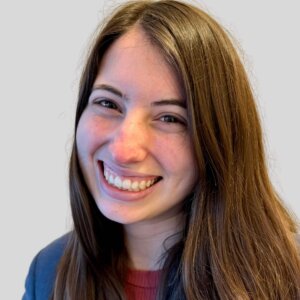Barbara Steinmetz and her husband, Howard, pose for a photograph at their home in Saginaw, Michigan in 2005. Photo by Jeffrey Sauger/Bloomberg via Getty Images
Barbara Steinmetz survived the Holocaust as a child, fleeing from country to country with her parents after Italian dictator Benito Mussolini stripped Italian Jews of their citizenship in 1938.
Nearly nine decades later, Steinmetz was among a dozen people injured in Boulder, Colorado after a man firebombed an event to raise awareness for hostages held in Gaza.
In a brief interview with NBC News, Steinmetz, 88, said the attack “has nothing to do with the Holocaust, it has to do with a human being that wants to burn other people.”
“It’s about what the hell is going on in our country,” she said. “What the hell is going on?”
Eight people were hospitalized after the attack, and four suffered moderate wounds. The man alleged to have carried out the attack, Mohamed Sabry Soliman, told investigators he wanted to “kill all Zionist people,” according to charging documents.
The attack came less than two weeks after a gunman killed two Israeli Embassy staffers outside the Capital Jewish Museum in Washington, D.C. The suspected gunman said “I did it for Gaza,” according to an eyewitness.
“We’re Americans,” Steinmetz told NBC News. “We are better than this.”
Steinmetz arrived in the United States in 1945 after years of displacement. She was born in Hungary and spent her early childhood on an island off the coast of Croatia, then a part of Italy, where her parents operated a hotel.
After Mussolini stripped Italian Jews of their citizenship, Steinmetz, her parents, and sister relocated to Hungary. As the Nazis advanced throughout Europe, the family was forced to flee again, to France and then Portugal.
With options running out, her father applied for asylum in a dozen countries, including the United States. In a video interview with the USC Shoah Foundation, Steinmetz read rejection letters from the many countries where her family was denied entry.
“My father tried to get us out in every way possible. There wasn’t a country to which he would not have been very happy, obviously, to immigrate to and where he felt that he and my mother could make a very fine contribution,” she said. “Unfortunately, they didn’t feel that way about it.”
Just one country accepted Steinmetz’s family: the Dominican Republic, where they immigrated in 1941. They settled in the coastal town of Sosúa, and Steinmetz and her sister enrolled in a Catholic boarding school where only the Mother Superior knew they were Jewish.
When Steinmetz was 9, her family moved to Boston, where her parents worked as dishwashers in a hotel. At first, Steinmetz and her family did not speak any English.
Steinmetz moved to Colorado in the mid-2000s. She has repeatedly told her story to local synagogues and schools, despite the trauma it brings up.
“Most of my adult life, frankly, I wanted to put all this behind me,” Steinmetz told the USC Shoah Foundation.
Steinmetz has also spoken out about current antisemitism.
Today, people “are afraid of wearing their Jewish stars,” Steinmetz said in an April interview with Stories of Antisemitism, as she held up her own Magen David necklace. “They’re taking down their mezuzahs…They’re not identifying themselves because they’re frightened.”

